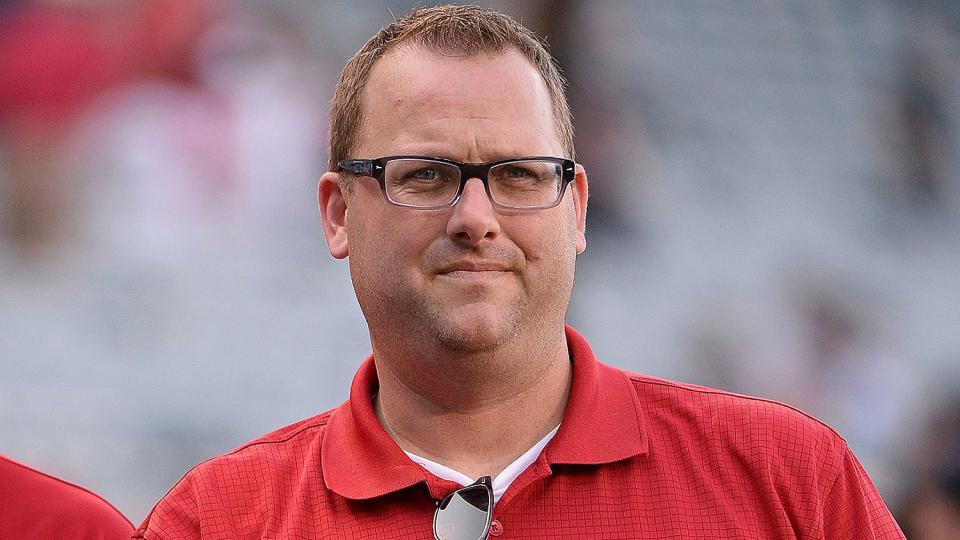Former Angels Employee Eric Kay Sentenced to 22 Years for Role in Tyler Skaggs' Overdose Death

- Oops!Something went wrong.Please try again later.
Scott Winters/Icon Sportswire via Getty Tyler Skaggs
A former Los Angeles Angels employee has been sentenced to 22 years for his involvement in the fatal overdose of Angels pitcher Tyler Skaggs in 2019.
Eric Kay, the former communications director for the MLB team was sentenced on Tuesday, the U.S. Attorney for the Northern District of Texas, Chad Meacham, announced in a release. He was convicted of the distributing of a controlled substance resulting in death and conspiracy to possess with intent to distribute controlled substances.
Kay's attorney, Cody Cofer, tells PEOPLE in a statement, "Mr. Kay was sentenced to 22 years--about 2.5 years below the top of the sentencing guidelines. The Government was seeking a sentence at the top of his guidelines. The lowest possible sentence was 20 years. Mr. Kay will immediately file his notice of appeal and continue to fight the allegations. This was a tragic circumstance. Our hearts break for Tyler Skaggs's family."
Cofer did not immediately respond to PEOPLE's request for comment.

Keith Birmingham/MediaNews Group/Pasadena Star-News via Getty Eric Kay
RELATED: Former Los Angeles Angels Staffer Eric Kay Found Guilty for His Role in the Death of Tyler Skaggs
Skaggs' family expressed gratitude for the sentencing.
"We are very grateful to everyone who worked so hard to investigate and prosecute Eric Kay, " said, according to the outlet. "Today's sentencing isn't about the number of years the defendant received. The real issue, in this case, is holding accountable the people who are distributing the deadly drug fentanyl."
Kay was convicted in February after evidence proved he gave Skaggs the pills that led to his death in a Dallas-area hotel room. Skaggs was 27.
"According to evidence presented at trial, Mr. Kay distributed the pills that killed Mr. Skaggs," the release from the U.S. Attorney's Office read.
Authorities first discovered Skaggs was dead after getting reports of his body being found in the Southlake Town Square Hilton in Texas. The Tarrant County Medical Examiner's office ruled that his body contained a mixture of ethanol, fentanyl, and oxycodone.
RELATED: Eric Kay Indicted on Drug Charges Related to Death of Angels Pitcher Tyler Skaggs
Police also seized a blue pill that they later confirmed was laced with fentanyl.
When first speaking with police, Kay said he didn't know Skaggs struggled with drug abuse and claimed he last saw Skaggs when checking into the hotel the day before.
"However, a search of Mr. Skaggs's phone revealed text messages from June 30 suggesting that he had asked Mr. Kay to stop by his room with pills late that evening," the release said. "Investigators later learned that, contrary to what he'd told law enforcement the day Mr. Skaggs's body was discovered, Mr. Kay had admitted to a colleague that he had, in fact, visited Mr. Skaggs's room the night of his death."
The Drug Enforcement Administration also discovered that Kay allegedly gave the same pills to Skaggs and other players at the stadium, with multiple former Angels players testifying during the trial that Kay gave them oxycodone pills.
"They further testified that he was the only source of these pills and would conduct transactions in the Angels Stadium," the District Attorney said.
During his sentencing hearing, prosecutors presented Kay's calls from behind bars, which they say prove he's not regretful about his actions.
In one call, he spoke about Skaggs and told his mother, "I hope people realize what a piece of s--- he is. Well, he's dead, so f--- 'em."
RELATED VIDEO: Everything to Know About Baseball Star Tyler Skaggs, 27, Who Was Found Dead in Texas Hotel Room
He also called Skaggs's family "dumb" and "white trash" as he alleged, "All they see are dollar signs. They may get more money with him dead than he was playing because he sucked."
He went on to call the jurors "fat, sloppy, toothless, and unemployed."
"The Skaggs family learned the hard way: One fentanyl pill can kill. That's why our office is committed to holding to account anyone who deals in illicit opioids, whether they operate in back alleyways or world-class stadiums," Meacham said after the sentencing. "Mr. Skaggs did not deserve to die this way. No one does. We hope this sentence will bring some comfort to his grieving family."
Never miss a story — sign up for PEOPLE's free daily newsletter to stay up to date on the best of what PEOPLE has to offer, from juicy celebrity news to compelling human interest stories.
"Today's sentencing of Eric Kay will not ease the suffering that the Skaggs' family have experienced since 2019," added Eduardo A. Chavez, Special Agent in Charge of DEA Dallas. "What the guilty verdict and sentencing proves is even if you sell only a small number of pills and one of those pills causes the death of an individual, you will be held responsible and sentenced to the fullest extent allowed by our judicial system."
"On behalf of the entire Angels Organization, our compassion goes out to the Skaggs family on this difficult day," Angels spokesperson said in a statement according to Reuters.
Skaggs was drafted by the Angels in 2009 as the No. 40 overall pick, per Bleacher Report. The following year he was traded to the Arizona Diamondbacks, playing in his first game in 2012. He went back to the Angels in 2013, and made 83 starts for the team between 2014 and 2019. He played in a total of 96 games during his time in the league.
If you or someone you know is struggling with substance abuse, please contact the SAMHSA helpline at 1-800-662-HELP.

